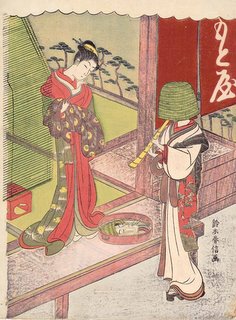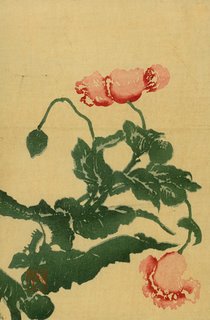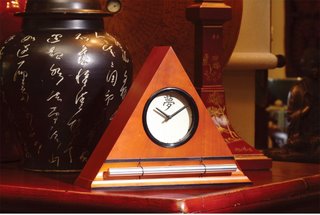
COURTESAN OF MONTOYA by Suzuki Harunobo
By Fleda Brown
Our local sangha had our 4-hour block meditation yesterday–people coming and going, with a number of us staying and sitting the whole time. Plus our 30-minute snack time afterward, which is gradually creeping into the realm of an actual meal, so much food!
Since we had no discussion group to tell you about, I thought for today I’d offer a few more poems you may not know. Here are two from Ryokan (1758-1831), a Japanese Buddhist hermit who spent much of his time writing poetryand doing calligraphy. His poetry is simple and inspired by nature. He loved children, and supposedly sometimes forgot to beg for food because he was playing with the children of the nearby village. Ryōkan refused to accept any position as a priest or even as a “poet.”
Too lazy to be ambitious,
I let the world take care of itself.
Ten days’ worth of rice in my bad;
a bundle of twigs by the fireplace.
Why chatter about delusion and enlightenment?
Listening to the rain on my roof,
I sit comfortably, with both legs stretched out.
And another:
The man pulling radishes
pointed the way
with a radish.
What I notice in what I’ll call “Buddhist poetry” is the way it takes the authority of the moment for granted. It doesn’t ask anything of me, the reader, other than to be a companion to the poem. It lacks decoration and it lacks self-consciousness, almost as if the speaker has to work up the energy to write it down, the poem that has just occurred to him/her.
We don’t fly away in these poems, as the nineteenth century poet John Keats put it, on the “wings of Poesy.” We don’t fly away anywhere. We are where we are, right here, and that’s just fine. Or, more to the point, it is what it is.

Peonies, c. 1900
Here’s another poem by Ghalib (1797-1869), a Persian poet from India. It’s translated by Jane Hirshfield, a contemporary Buddhist poet:
For the raindrop, joy is in entering the river—
Unbearable pain becomes its own cure.
Travel far enough into sorrow, tears turn to sighing;
In this way we learn how water can die into air.
When after a heavy rain, the stormclouds disperse,
Is it not that they’ve wept themselves clear to the end?
If you want to know the miracle, how wind can polish a mirror,
Look: the shining glass grows green in spring.
It’s the rose’s unfolding, Ghalib, that creates the desire to see—
In every color and circumstance, may the eyes be open for what comes.
This one seems a bit like a “teaching poem,” doesn’t it? It doesn’t seem to be just opening the immediate moment to a companion—it’s “telling me” something. But look again: it’s telling the speaker himself something. He’s speaking this to himself. So really, it looks as if it’s the same simple seeing as in the poems by Ryokan.
adapted from Spirituality and Health Magazine, Feb. 2012

soothing chime alarm clocks
Now & Zen
1638 Pearl St.
Boulder, CO 80302
(800) 779-6383
Posted in Chime Alarm Clocks, Zen Alarm Clock